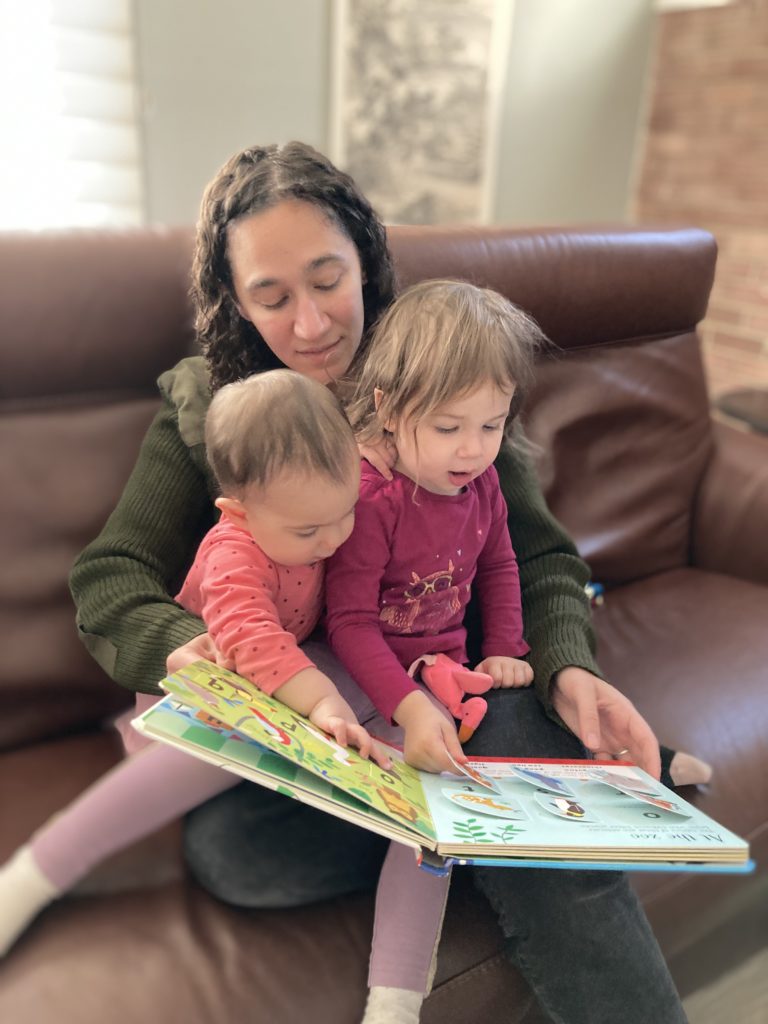This year began with a baby, had a move in the middle, and I’m now getting to discover what normal might look like in our new state. These were my favorite books I read over the course of the year, listed in roughly chronological order.
Women’s Work: The First 20,000 Years: Women, Cloth, and Society in Early Times by Elizabeth Wayland Barber
An interesting history of weaving, mothering, and friendship. I wrote about it on Other Feminisms here (“Women’s Work is Communal”).
Mothers have toddlers underfoot, and need a workspace that is relatively safe for marauding children (keeping the children safe from the work and vice versa). Mothers benefit from work that is somewhat interruptible, as a child demands attention or needs to nurse. And mothers have an easier time with shared work, when a group of women can watch children together or trade off baby- vs heddle-wrangling.
It’s given me a way of thinking about how we design work and chores, and I’m grateful for it.
Love’s Labors: Essays on Women, Equality and Dependency by Eva Feder Kittay
Everyone told me to read this, and they were right. I drew heavily on Kittay for my Mere Orthodoxy piece “How to Value Caring Work.”
In Kittay’s view, care is never a private matter, something that can be contained in a single dyad or family. Dependency creates a chain of need, which extends out into the wider world. She takes the relationship of mother and child as paradigmatic: “The relation between a needy child and the mother who tends to those needs is analogous to the mother’s own neediness and those who are in a position to meet those needs.” Caring for a child makes the mother more dependent, and gives her a just claim on others, just as the baby has a claim on her.
Kittay terms this framework doulia. She adapts doulia from doula, a person who offers care to a laboring mother. In her broader term, she encompasses “a concept of interdependence that recognizes a relation — not precisely of reciprocity but of nested dependencies — linking those who help and those who require help to give aid to those who cannot help themselves.”
The Orchid Thief by Susan Orlean
One of the books on my list that I read, and my husband half-read, since I read so many passages aloud. It’s non-fiction that is more outrageous than fiction could ever dare. Orlean profiles a man who believed he had found a loophole to let him poach a protected orchid legally. The book is a rollicking tale.
Kingdom of Characters: The Language Revolution That Made China Modern by Jing Tsu
There are a couple genres of non-fiction that I love. One is “biographies of things that aren’t people” (e.g. Salt, Empires of the Sky, etc). Another is “how did all this get organized?” (e.g. Inventing Temperature, A Place for Everything: The Curious History of Alphabetical Order, etc.). This is one of those.
The book is about how the Chinese language found ways to interlock with the industrialized and then computerized age. A particular highlight was the character-keyboard that the typist operated by playing chords of keystrokes.
Six Frigates: The Epic History of the Founding of the U. S. Navy by Ian W. Toll
The book that will let you say to your loved ones, “Do you have fifteen minutes for me to read you this naval battle in full?” I loved it, and while I was reading it, I felt intensely torn—I knew from history class that we had won the War of 1812, but it’s very hard it to believe it ends up that way when you read about the war in detail.
Flying Blind: Boeing’s Max Tragedy and the Lost Soul of an American Icon by Peter Robison
Fascinating, detailed, and infuriating. The well-reported story of how Boeing adopted a GE-inspired focus on quarterly profit and loss… and hollowed out engineering and testing to chase short-term savings. The Boeing Max 8 killed hundreds of passengers, and, every step of the way, there was a Boeing employee or regulator trying to sound alarms.
It’s a cautionary tale both about regulatory capture and stagnation. The Max8 was a bad plane from the get-go, since, instead of being designed de novo, it was an attempt to make a new plane that could pass as an update of an old plane (and thus receive less regulatory scrutiny). They had to keep designing weird kludges to avoid building the plane right if that meant building it differently.
Tell Me Everything: The Story of a Private Investigation by Erika Krouse
CW: Memoir by a sexual abuse survivor who works as a PI investigating a sexual assault and culture of abuse on a college campus.
Very well written and thoughtful. Krouse asks a lot of the people she interviews since she may need them to testify in a multi-year suit against a school with enough money to make the fight painful. She thinks hard about what kind of win could be worth it.
Shy: The Alarmingly Outspoken Memoirs of Mary Rodgers by Mary Rodgers with Jesse Green
Best footnotes of the year. Mary Rodgers narrates her life in a voice that is both tart and wistful. The footnoting she and Jesse Green (theater reviewer for the New York Times) worked out gives her the freedom to tell stories as she remembers them, with some corrections running in counterpoint. A highlight was hearing her recount how the parts in Once Upon a Mattress were all tailored to the needs of it’s initial workshop cast (including a mute king for a tone deaf singer).
And if you’re interested, my list from 2021 is here.


[…] And if you’re interested, this was my best-of list for 2022. […]